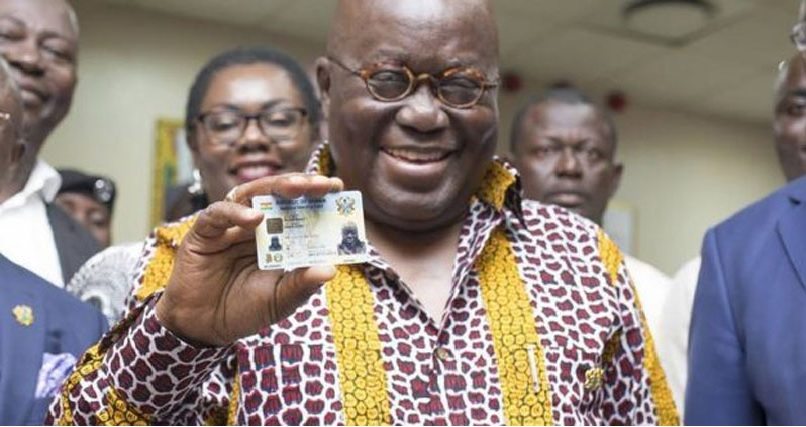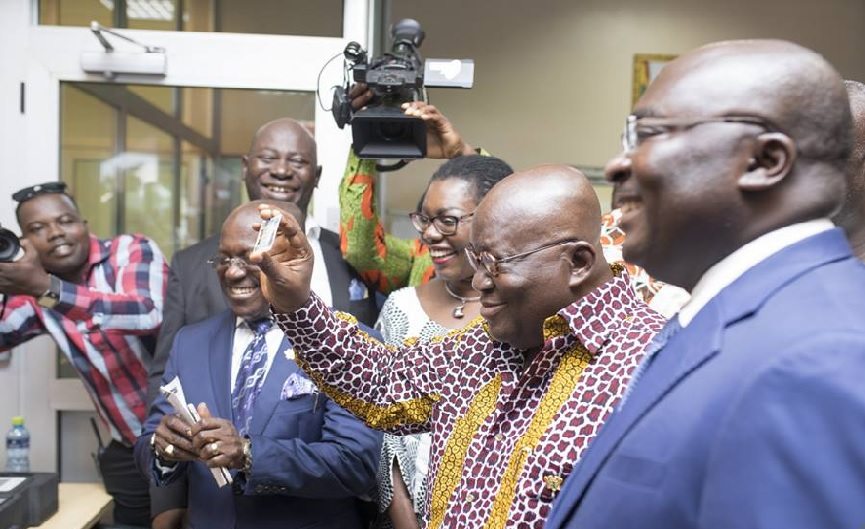
President Akufo-Addo has continued to prove his willingness and readiness to fulfill the promises he made to Ghanaians prior to his election victory in December 2016. Though many doubted him and his capacity to be a good leader, his staunch supporters can definitely breathe a sigh of relief, knowing that their president-elect is indeed the better choice of all other candidates that sort the same position during the polls.
In terms of the identification card, the President has become the first recipient of the new national ID card – Ghana card. As at last week, the National Identification Authority (NIA) began the process of capturing all the biometric data of all Ghanaian citizen.
Speaking at the launch of the Ghana Card on September 16, 2017, President Akufo-Addo said the exercise signaled “the dawn of a new day in biometric identity management in Ghana and the virtues of a public-private partnership arrangement in meeting development needs.”

Nana Addo on the same day had gone through registration formalities and was issued his card.
The Ghana Card
The registration process started under the erstwhile Kufuor administration but stalled under the National Democratic Congress (NDC) government.
Between July 2008 and May 2010, the NIA began mass registration of Ghanaians for the unique ID card. A total of 11 million people in six regions were registered in the process.
Amidst various challenges, the collection of the cards started later in 2011. However, the programme developed a fault, leading to the rejection of the card by key institutions. Anyway, the Ghana card has bounced back and is very efficient. The new Ghana Card is said to be an improvement over the previous one and meets all international standards required of such identity document.
The new card will take advantage of new technologies such as tactile elements for the blind, chip embedding technology and iris capabilities in addition to taking all 10 fingerprints of an applicant.
Another unique change that came with the new card is that the exercise would involve the registration of ages 0 – 5. According to Nana Addo, “this is a historic opportunity for us to sanitize and rationalize birth certification in Ghana and ensure social inclusion right from birth.”
The role of the NIA, Akufo Addo said, was crucial in the management and development of Ghana. This was why the President pledged to provide the outfit with the requisite support to enable it to perform its functions effectively.
The Executive Secretary of the National Identification Authority (NIA), Prof. Ken Attafuah has thus made the announcement that documents such as voters identity cards, National Health Insurance cards, driving licenses, and baptismal certificates will no longer be accepted as a means of identification when trying to procure the Ghana Card. According to Attafuah, only passports and birth certificates will be approved as the initial identification document for acquiring the Ghana Card. This is based on the stipulations of the National Identification Amendment Law 2017 (Act 950).
To further ensure that this latest development has the longevity Ghanaians deserve, NIA trained 2,700 commissioners under oath of service. These commissioners would then go on to execute their duties alongside NIA staff during registration of citizens for the Ghana Card. In an interview with the Daily Graphics, Attafuah explained that the commissioners under oath would do well to facilitate ready services for Ghanaian citizens who for certain pertinent reasons, lack the required documents at a stipulated time. When such situations occur, the process will be initiated; but then, the card will only be issued when the said documents have been presented. It is expected that this would curb the delay citizens go through when procuring the card.
See Also: GhanaPostGPS App “How To Download, Register and Use The New Navigation Technology”
In terms of subsidizing the financial burden of running this technology, in such a manner that will make the cards available to as many Ghanaians as possible in the shortest possible time, the government in partnership with private institutions would bear certain cost incurred.
It is estimated that the running cost from the time of implementation – Monday, May 28, 2018 – to the next 15 years, will amount to about $1.2 billion. This amount will be shared between the government and the Identity Management System (IMS). The government would contribute $531 million while IMS, in partnership with NIA under a public/private partnership (PPP) agreement, will cater for the balance of $678 million.
HOW TO REGISTER
To facilitate the issuance of the Ghana Card, any or all of the following is required:
- Passport
- Resident permit
Registration Process
-
- For anyone who is eligible to own this card (including qualified foreign nationals), you will need to purchase a scratch card called the FIMS Scratch Card at any approved NIA Premium Lounge Centre or any CAL Bank branch.
- Application forms should be filled after downloading it online.
- Once you’re done filling the form, present the application form and the FIMS Scratch Card at the designated registration center.







